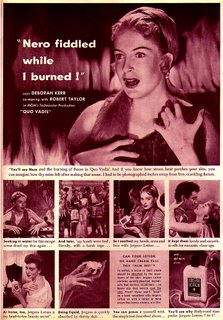 Well, I am feeling strangely liberated. A few days ago, I learned that my BlogMad account had been wiped out as a result of some database corruption—a common occurrence, if comments from fellow web journalists are any indication. I chose not to sign up anew right away, luxuriating instead in the thought of temporarily forgoing those new-fangled ways in favor of an old-fashioned book. Despite my doctorate in literature, I don’t read nearly as much as I ought to these days. So, I took advantage of the first warm day of the season, ripped off my shirt, and grabbed . . . a Trollope. Anthony Trollope, that is, who happens to be one of my favorite authors. Recently, I picked up his Cousin Henry (my, doesn’t this begin to sound so Carry On!) after discovering that this novel is set in Wales, that strange and wild country west of England I am still struggling to call my home.
Well, I am feeling strangely liberated. A few days ago, I learned that my BlogMad account had been wiped out as a result of some database corruption—a common occurrence, if comments from fellow web journalists are any indication. I chose not to sign up anew right away, luxuriating instead in the thought of temporarily forgoing those new-fangled ways in favor of an old-fashioned book. Despite my doctorate in literature, I don’t read nearly as much as I ought to these days. So, I took advantage of the first warm day of the season, ripped off my shirt, and grabbed . . . a Trollope. Anthony Trollope, that is, who happens to be one of my favorite authors. Recently, I picked up his Cousin Henry (my, doesn’t this begin to sound so Carry On!) after discovering that this novel is set in Wales, that strange and wild country west of England I am still struggling to call my home.
Now, Trollope was a decidedly pragmatic novelist. His novels, on the whole, do not concern boys and girls in the throes of love, but—how refreshing!—mature men experiencing various kinds of moral dilemmas or sophisticated quandaries. Elizabeth Bowen wrote a radio play about the author and his characters, but I have yet to come across a production of it. For romance I turn instead to something like Jane Eyre, whose author, Charlotte Brontë, was born on this day, 21 April, in 1816.
What it does not tell you, of course, is that Jane Eyre happens to be one of the most frequently radio-dramatized novels of the Victorian era or, for that matter, of any era. Next to Dickens’s “Christmas Carol,” no other story has aired more often than Jane’s, even though she was often rendered next to unrecognizable in the process.
To those familiar with and fond of the original narrative, the liberties taken by the version-crafters for screen and radio can be rather exasperating. Yet the disdainful sophisticates who dismiss the resulting pop-cultural bastards sight unseen (or sound unheard) sure miss out on some audacious rackets, such as the pitch made by the announcer of the Lux Radio Theatre in the introduction to the 14 June 1948 broadcast of Jane Eyre (or some such gal’s tale)! To accommodate the show’s sponsor, the spokesperson for Lever Brothers was called upon to ponder the question how Ms. Brontë—who, according to one biographer, liked lace—ever managed to wash her clothes without the benefit of Lux Flakes.
Rather more insightful was a radio lecture delivered on 3 April 1949 during the NBC University Theater production of Jane Eyre, in which Deborah Kerr (pictured above, in another kind of commercial dilemma) portrayed the titular heroine. Noted novelist James Hilton provided a brief but smart commentary, touching upon the reception of the novel, its biographical background, its historical significance, and its relevance for twentieth-century audiences.
To be sure, Hilton conceded, Jane Eyre was a “good story with all the popular ingredients—melodrama, romance, and a happy ending”; but
what gave it life is what gave it birth: a quality of passionate imagination which could make a shy spinster governess the equal, in her own mind and by her own showing, of a Sappho or a Cleopatra.
Come to think of it, Hilton’s mentioning of H. G. Wells’s Ann Veronica in this context recently induced me—someone more readily influenced by smart authors than smarmy advertisers—to get hold of a copy of the latter novel as well.
Many cuts and bruises were inflicted upon plain Jane during those supposedly aureate days of radio; and, with an emphasis on romantic melodrama at the expense of narration, more attention was drawn to that screaming madwoman in the attic than to the reflections of the troubled young governess who discovered her secret. In this respect, old-time radio was like a Victorian orphanage: expect to find negligence, exploitation, and very little recognition, let alone respect, for the suffering brainchild.
Through it all, Jane Eyre survived considerable hardship and cruelty to remain, to this day, one of the most robust heroines of all fiction.
Discover more from Harry Heuser
Subscribe to get the latest posts sent to your email.

Happy reading Harry. I may join you in spring time read, though I\’ll be leaving my shirt firmly on. I wouldn\’t want to scare the neighbours…
LikeLike
Never mind the cows and sheep, Michael. Let\’s open that book club in the hills.
LikeLike
Cool blog site. Nice to see an unabashed intellectual expressing the complexities of his field. I\’ll have to read more.I also got deleted from blogmad. Fortunately, I had negative credits at the time. . .
LikeLike
For the most part, I am merely being blissfully polysyllabic, undaunted by the fact that blogs, when shared via services such as BlogMad, are not so much read, but trod upon in a stampede of credit-generating passers-by. Thank you for slowing down.
LikeLike